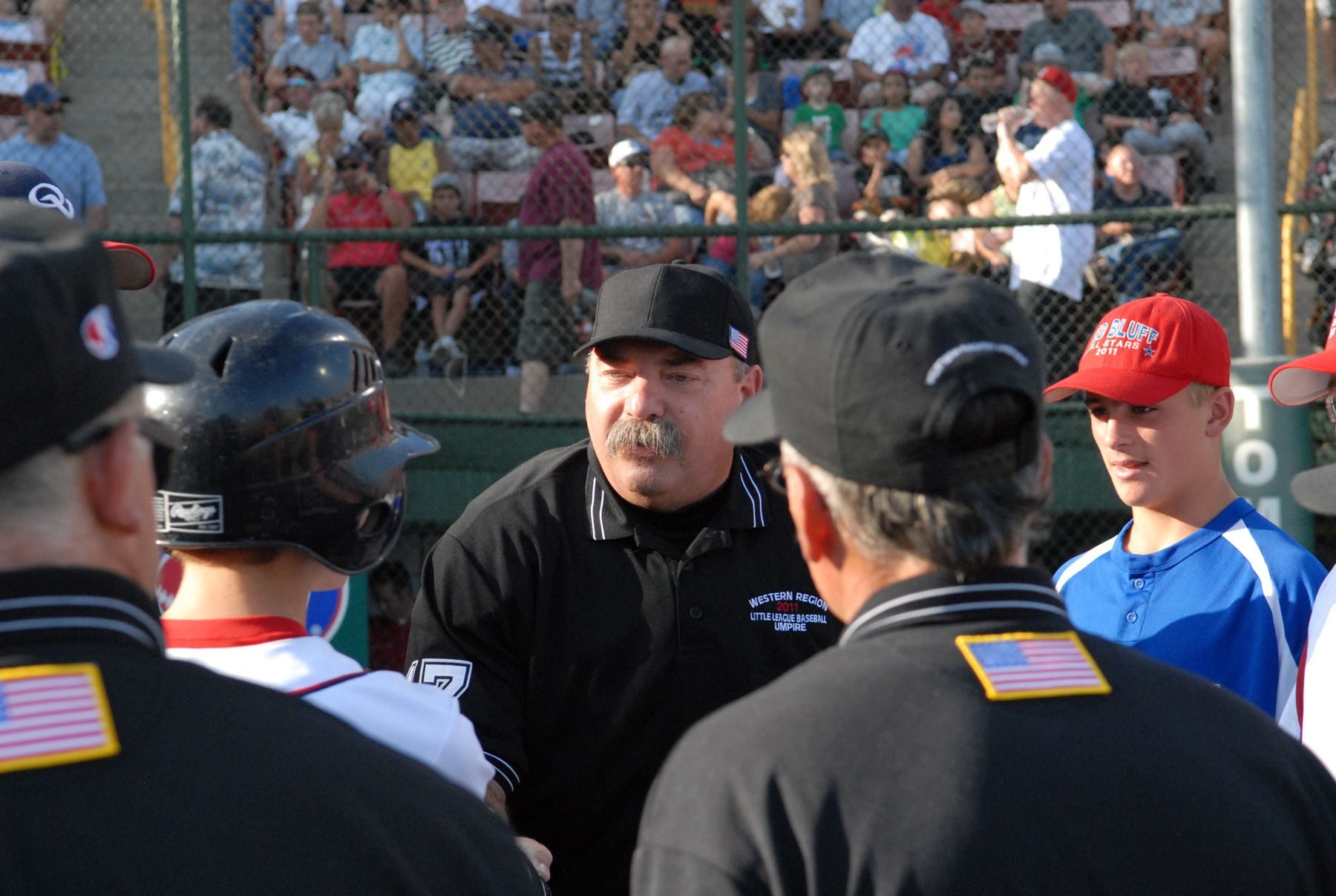DID YOU KNOW?
• Five umpires from Clark County were selected to work regional or World Series tournaments in 2011. They were:
• Don Fitzgerald umpired at the Big League Softball (18-and-younger) West Region Tournament in Palmdale, Calif.
• Nick Haluschak umpired at the Little League Baseball Western Regional Tournament at San Bernardino, Calif.
• Darrin Leggett umpired at the Europe, Mediterranean and African regional for Junior League (14 and younger) baseball at Kunto, Poland, and at the Senior League Softball (16-and-younger) West Regional in Missoula. Mont.
DID YOU KNOW?
• Five umpires from Clark County were selected to work regional or World Series tournaments in 2011. They were:
• Don Fitzgerald umpired at the Big League Softball (18-and-younger) West Region Tournament in Palmdale, Calif.
• Nick Haluschak umpired at the Little League Baseball Western Regional Tournament at San Bernardino, Calif.
• Darrin Leggett umpired at the Europe, Mediterranean and African regional for Junior League (14 and younger) baseball at Kunto, Poland, and at the Senior League Softball (16-and-younger) West Regional in Missoula. Mont.
• Linda Newton umpired at the Europe, Mediterranean and African regional for Little League softball at Ramstein, Germany and at the Little League Softball World Series in Portland.
• Dave Palenshus umpired at the Europe, Mediterranean and African regional for Junior League (14 and younger) baseball at Kunto, Poland.
• Little League umpires are not paid. They pay their own transportation to and from tournaments, and are housed and fed during the run of the tournament.
• Linda Newton umpired at the Europe, Mediterranean and African regional for Little League softball at Ramstein, Germany and at the Little League Softball World Series in Portland.
• Dave Palenshus umpired at the Europe, Mediterranean and African regional for Junior League (14 and younger) baseball at Kunto, Poland.
• Little League umpires are not paid. They pay their own transportation to and from tournaments, and are housed and fed during the run of the tournament.
When the Little League Softball World Series championship was decided in August, Linda Newton was right in the middle of the action at Alpenrose Dairy in Portland.
When Southern California champion Huntington Beach battled Northern California champion Red Bluff for a spot in the Little League World Series, Nick Haluschak had the best perch in San Bernardino.
Newton and Haluschak were two of five area umpires selected by Little League to work major tournaments in 2011. Don Fitzgerald, Darren Leggett and Dave Palenshus also worked regional tournaments for Little League.
The big-tournament assignments were recognition for years of dedication to a craft that when performed at its best goes unnoticed.
Both Newton and Haluschak earned prime assignments. Newton was the umpire at third base for the Little League Softball World Series championship game. She also was behind home plate for games at the World Series.
Haluschak was the home plate umpire for the Western Regional baseball championship game, calling balls and strikes as 14,000 spectators and a national television audience watched.
It was a tense game that Huntington Beach won with a sixth-inning home run. That team went on to win the Little League World Series championship.
Despite the intensity of the contest, the stakes riding on the outcome, and the spotlight on an event shown nationally on ESPN, Haluschak said he felt right at home calling balls and strikes.
Haluschak learned the night before the game that he was assigned home plate, an honor based on grades earned during the tournament. He said he started visualizing the game right away and focused on taking deep breaths.
“It would be real easy to let your adrenaline take over” knowing that 14,000 fans in the stadium and a television audience is watching everything, Haluschak said.
As fun as that game was to call, and as great as the elation Haluschak felt at the conclusion of the contest was, the big stage isn’t what drives him and his umpiring brethren to dedicate themselves to an under-appreciated hobby.
A civil engineer, Haluschak said he realized he wanted to get serious about umpiring when he discovered that it was a good way to escape from life’s other pressures.
Most Little League coaches have to do some umpiring, too, in order to get games played. Some of them find umpiring enjoyable and rewarding, and dedicate themselves to becoming good at it.
“I didn’t realize until I got out there that being behind the plate is the best view of the game,” Leggett said.
Like many umpires, Leggett got his start when his one of his son’s games needed a fill-in umpire. More than a decade later, Leggett traveled to tournaments in Kunto, Poland, and in Missoula, Mont.
Like his colleagues, Leggett said he never could have earned those opportunities without the support from his family and his boss, who allows him the scheduling flexibility that umpires require.
For Newton, the Little League Softball World Series assignment capped a rewarding 2011 and a distinguished career.
She started umpiring baseball nearly two decades ago because she thought she’d be better at it than most of the guys calling games. She has called countless baseball and softball games from Little League to high school.
Her 2011 assignments included the Washington Class 1B/2B high school softball state tournament, the Little League Softball European regional in Ramstein, Germany, and the Little League Softball World Series.
Newton said it was the perfect year to put away her clicker and mask.
“I want to do other things now,” she said.
Umpiring can take a lot of time. Newton said when she was calling high school baseball, American Legion baseball, Babe Ruth baseball and Little League, she worked more than 100 games in a season. Haluschak said he remembers working more than 130 games in one season covering Little League, high school and Vancouver Girls Softball Association games.
Little League does not pay its umpires. But the level of training available to those who want to attend clinics is top-notch, Fitzgerald said. He is 70 years young and still passionate about Little League as an organization and about umpiring as a craft.
Fitzgerald said he became more interested in umpiring than coaching when he realized that “I don’t have to worry about preparing a whole group of players. I only have to prepare myself.”
Being selected to umpire regional and World Series tournaments is testament to the umpires’ skill and dedication, and a rewarding experience. But umpiring brings rewards much more regularly than the occasional big-tournament moment.
Veterans explain that umpiring teaches problem-solving and decision-making skills that help in work and family life.
One thing Newton said she will most miss about umpiring is getting to know so many young people as they grow up on the diamond.
“You get to see little kids grow up and see young players improve from the start of a season to the end,” she said. “That is one real gratifying thing about umpiring.”




